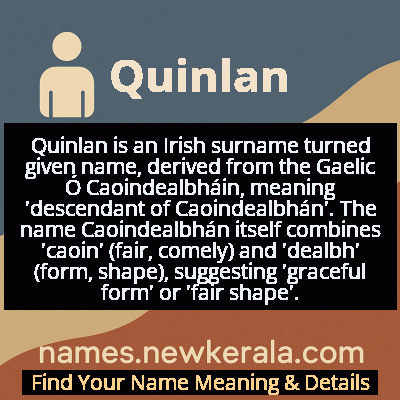Quinlan Name Meaning & Details
Origin, Popularity, Numerology Analysis & Name Meaning of Quinlan
Discover the origin, meaning, and cultural significance of the name QUINLAN. Delve into its historical roots and explore the lasting impact it has had on communities and traditions.
Name
Quinlan
Gender
Male
Origin
Irish
Lucky Number
7
Meaning of the Name - Quinlan
Quinlan is an Irish surname turned given name, derived from the Gaelic Ó Caoindealbháin, meaning 'descendant of Caoindealbhán'. The name Caoindealbhán itself combines 'caoin' (fair, comely) and 'dealbh' (form, shape), suggesting 'graceful form' or 'fair shape'.
Quinlan - Complete Numerology Analysis
Your Numerology Number
Based on Pythagorean Numerology System
Ruling Planet
Neptune (Ketu)
Positive Nature
Intuitive, analytical, spiritual, and inquisitive.
Negative Traits
Secretive, reserved, aloof, and can be overly critical.
Lucky Colours
Green, yellow.
Lucky Days
Monday.
Lucky Stones
Cat’s eye, moonstone.
Harmony Numbers
1, 5, 6.
Best Suited Professions
Scientists, researchers, spiritual leaders, detectives.
What People Like About You
Depth of knowledge, analytical skills, spirituality.
Famous People Named Quinlan
Quinlan Vos
Jedi Master
Prominent Jedi during the Clone Wars known for his unique abilities and complex character arc
Quinlan Terry
Architect
Influential classical architect known for reviving traditional architectural styles in modern Britain
Saint Quinlan
Religious Figure
Early Irish saint who founded churches in County Clare and is venerated in Irish Catholic tradition
Quinlan O'Gorman
Rugby Player
Irish rugby union player who represented Ireland in early international matches
Name Variations & International Equivalents
Click on blue names to explore their detailed meanings. Gray names with will be available soon.
Cultural & Historical Significance
During the 19th century, many Quinlans emigrated during the Great Famine, spreading the name to North America, Australia, and Britain. The name carries the legacy of Irish resilience and cultural preservation through centuries of political and social change. In Irish tradition, names were believed to influence character, and Quinlan's meaning of 'graceful' was considered an auspicious quality, suggesting both physical grace and social elegance. The name's survival through centuries of English domination represents the endurance of Irish language and identity.
Extended Personality Analysis
Individuals named Quinlan are often perceived as graceful, both in physical movement and social interactions. They typically possess a natural elegance and poise that makes them stand out in social situations. Quinlans are known for their diplomatic nature, able to navigate complex social dynamics with ease and charm. They tend to be creative problem-solvers who approach challenges with both intelligence and emotional intelligence. Many Quinlans demonstrate strong artistic sensibilities and appreciate beauty in various forms, from visual arts to music and literature.
Their graceful nature extends to how they handle adversity—they face difficulties with dignity and resilience rather than aggression. Quinlans often make excellent mediators and team members because they can understand multiple perspectives and find harmonious solutions. While they may appear reserved initially, they form deep, meaningful relationships and are fiercely loyal to those they care about. The name's Irish origins also suggest a connection to storytelling and oral tradition, with many Quinlans exhibiting strong communication skills and the ability to captivate audiences with their words.
Modern Usage & Popularity
In contemporary times, Quinlan has experienced a resurgence as a first name, particularly among parents seeking unique yet traditional Irish names. While still relatively uncommon, its usage has steadily increased since the 1990s, coinciding with the broader Celtic revival trend in baby naming. In the United States, Quinlan ranks outside the top 1000 names but shows consistent usage, especially in areas with strong Irish-American communities like Boston, Chicago, and New York. The name appeals to modern parents for its distinctive sound, rich cultural heritage, and gender-neutral potential (though traditionally male). Social media and popular culture have contributed to its growing visibility, with fictional characters and influencers bringing attention to this classic yet fresh-sounding name. Educational data shows Quinlan appearing more frequently in birth announcements and school registries, indicating a slow but steady rise in popularity among millennial parents valuing both tradition and individuality.
Symbolic & Spiritual Meanings
Symbolically, Quinlan represents the ideal balance between strength and grace—the concept of being 'well-formed' extends beyond physical appearance to character and spirit. The name embodies the Irish cultural values of resilience tempered with elegance, suggesting someone who can withstand life's challenges without losing their inherent dignity. In metaphorical terms, Quinlan symbolizes the oak tree—strong and deeply rooted yet graceful in its form and movement. The name carries connotations of artistic creation and craftsmanship, reflecting the original meaning of being 'well-shaped' or 'gracefully formed.' It represents the Celtic ideal of inner beauty manifesting in outward grace, where physical elegance is matched by moral and emotional refinement. Quinlan also symbolizes cultural continuity—maintaining tradition while adapting to modern circumstances, much like the Irish diaspora has preserved its heritage across generations and continents. The name serves as a bridge between ancient Celtic traditions and contemporary global culture, embodying the timeless human aspiration toward balanced perfection.

